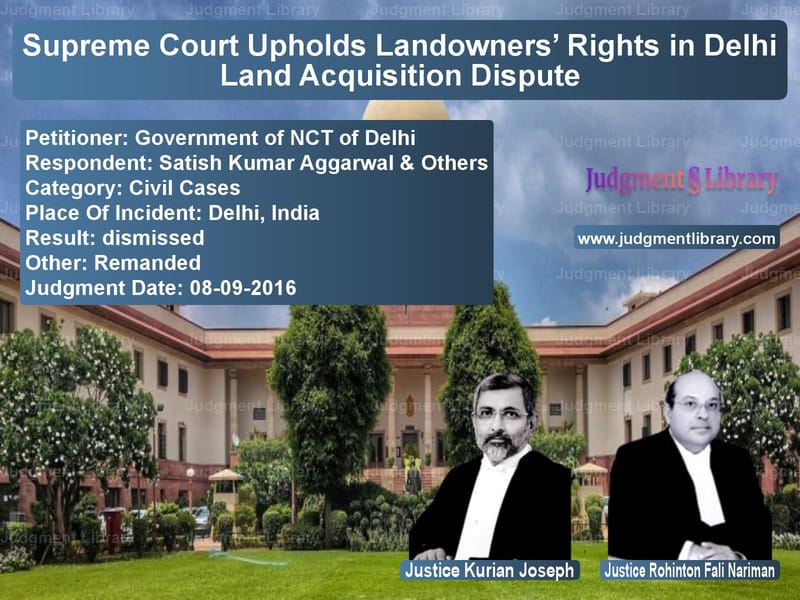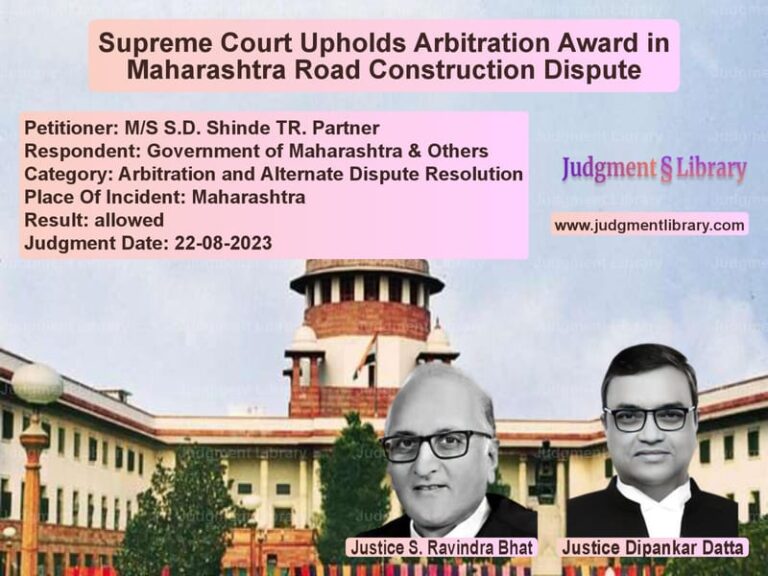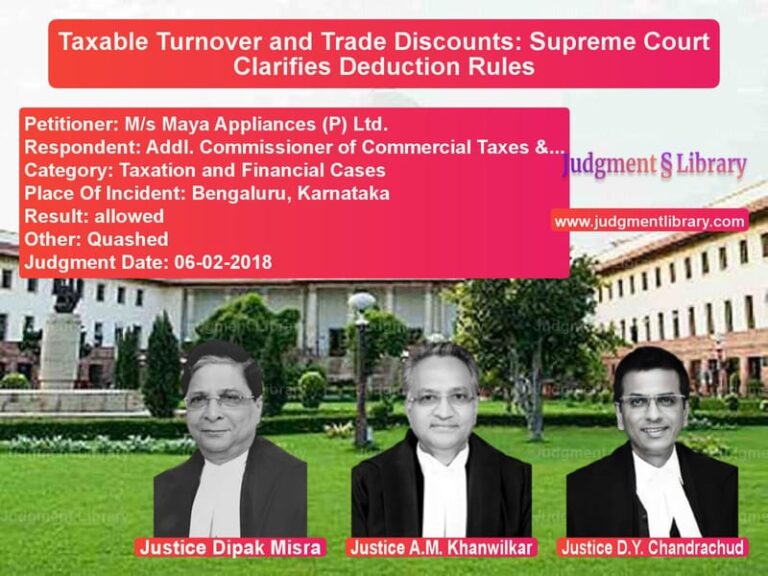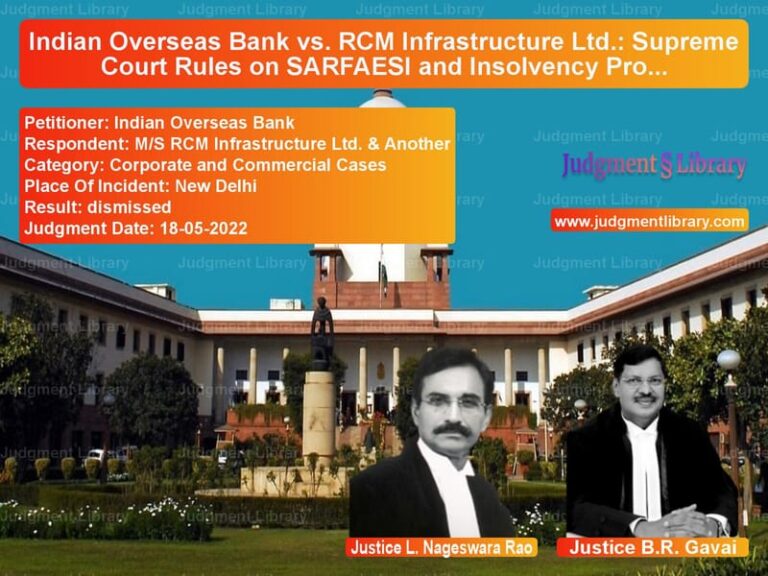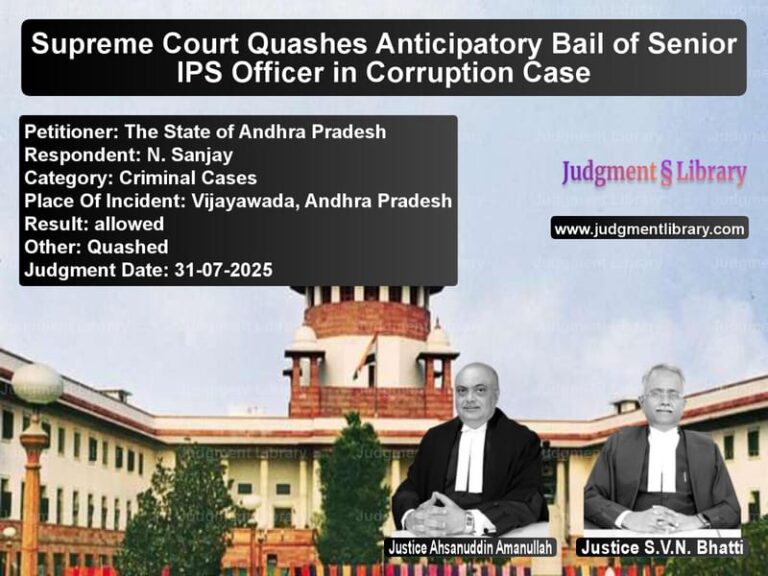Supreme Court Upholds Landowners’ Rights in Delhi Land Acquisition Dispute
The case of Government of NCT of Delhi and Anr. v. Satish Kumar Aggarwal & Others deals with the controversial issue of land acquisition in Delhi. The Supreme Court dismissed multiple appeals filed by the Government of NCT of Delhi, reaffirming the rights of landowners under the Right to Fair Compensation and Transparency in Land Acquisition, Rehabilitation and Resettlement Act, 2013. The Court also granted the government a one-year period to initiate fresh acquisition proceedings.
Background of the Case
The dispute arose when the Delhi government attempted to acquire land under the Land Acquisition Act. The landowners argued that the acquisition process had lapsed under the provisions of the 2013 Act, which replaced the earlier land acquisition law and introduced stricter guidelines for compensation and rehabilitation.
The government challenged this claim, seeking validation of the land acquisition process. However, similar cases had already been decided in favor of landowners, prompting the Supreme Court to rely on its previous rulings.
Key Legal Issues
- Was the land acquisition valid under the provisions of the 2013 Act?
- Did the landowners have a right to reclaim possession under Section 24(2) of the Act?
- Did the Supreme Court’s previous decisions on similar cases apply to this matter?
Arguments from the Appellant (Government of NCT of Delhi)
- The government argued that the land was lawfully acquired for public use.
- It contended that the landowners’ claims were procedurally flawed and should not be entertained.
- The government sought time to initiate fresh acquisition proceedings if necessary.
Arguments from the Respondents (Landowners)
- The respondents maintained that the acquisition had lapsed under Section 24(2) of the 2013 Act.
- They argued that they had not received fair compensation for their land.
- The landowners cited earlier Supreme Court rulings that had invalidated similar acquisitions.
Supreme Court’s Judgment
1. Dismissal of the Appeals
The Supreme Court observed that the issue had already been decided in Civil Appeal No. 8477 of 2016. The judgment stated:
“The issue, in principle, is covered against the appellant by judgment in Civil Appeal No. 8477 of 2016.”
Accordingly, all the appeals filed by the Government of NCT of Delhi were dismissed.
2. Granting One-Year Period for Fresh Acquisition
Recognizing the government’s interest in the land, the Court granted a period of one year to initiate fresh acquisition proceedings under Section 24(2) of the 2013 Act. The judgment stated:
“The appellant is given a period of one year to exercise its liberty granted under Section 24(2) of the Right to Fair Compensation and Transparency in Land Acquisition, Rehabilitation and Resettlement Act, 2013 for initiation of the acquisition proceedings afresh.”
3. Return of Land to Original Owners
The Supreme Court made it clear that if no fresh acquisition proceedings were initiated within the specified period, the government must return possession of the land to the original landowners. The judgment stated:
“In case no fresh acquisition proceedings are initiated within the said period of one year from today by issuing a Notification under Section 11 of the Act, the appellant, if in possession, shall return the physical possession of the land to the original landowner.”
Implications of the Judgment
This ruling reinforces several legal principles:
- Landowners have strong legal protections under the 2013 Act.
- The government must follow due process when acquiring land.
- The Supreme Court will not entertain repetitive litigation on the same issue.
- Government agencies must act within prescribed time limits to retain legally acquired land.
Key Takeaways
- Land acquisition must comply with the principles of fairness and transparency.
- Governments cannot delay acquisition proceedings indefinitely.
- Landowners have a right to reclaim their land if acquisition is not completed properly.
- The Supreme Court enforces strict timelines to prevent unnecessary delays in legal proceedings.
Conclusion
The Supreme Court’s decision in Government of NCT of Delhi and Anr. v. Satish Kumar Aggarwal & Others underscores the importance of legal safeguards in land acquisition matters. By dismissing the government’s appeals and providing a one-year deadline for fresh acquisition, the Court upheld the rights of landowners while ensuring that legal processes are followed in future land acquisition cases.
Don’t miss out on the full details! Download the complete judgment in PDF format below and gain valuable insights instantly!
Download Judgment: Government of NCT of vs Satish Kumar Aggarwa Supreme Court of India Judgment Dated 08-09-2016-1741883763550.pdf
Direct Downlaod Judgment: Direct downlaod this Judgment
See all petitions in Property Disputes
See all petitions in Damages and Compensation
See all petitions in Landlord-Tenant Disputes
See all petitions in Judgment by Kurian Joseph
See all petitions in Judgment by Rohinton Fali Nariman
See all petitions in dismissed
See all petitions in Remanded
See all petitions in supreme court of India judgments September 2016
See all petitions in 2016 judgments
See all posts in Civil Cases Category
See all allowed petitions in Civil Cases Category
See all Dismissed petitions in Civil Cases Category
See all partially allowed petitions in Civil Cases Category

